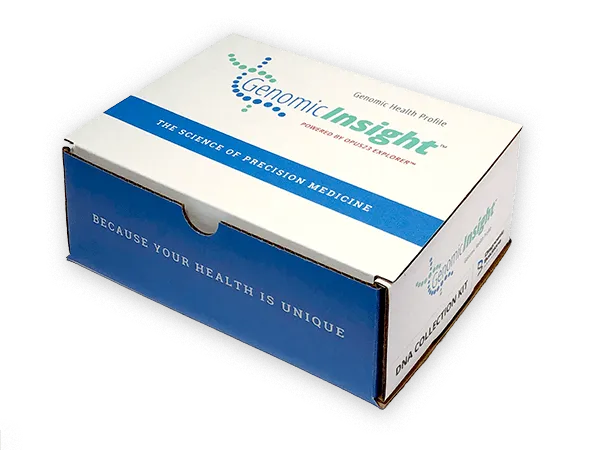Personalized Medicine Test
Unlock a treatment approach tailored specifically to your unique biology. Our personalized medicine test analyzes your genetic, biochemical, and lifestyle markers to create a customized health plan—targeting the root causes, not just the symptoms. Take the guesswork out of your wellness journey.
What is Personalized Medicine?
Personalized or precision medicine is a healthcare model that customizes treatment to the needs of each patient.
Traditional medicine often relies on a standard of care that is geared toward an entire patient population. For example, patients with the same symptoms may be prescribed a standard antibiotic used to eradicate a suspected infection.
One patient may respond to the antibiotic, but the other may remain symptomatic. The different outcomes occur because every patient is unique. Patient A may have one infection, but Patient B may have the same infection and a co-infection or a parasite.
In the absence of highly specific and quantitative testing results, the differences between Patient A and Patient B are obscured.
Personalized medicine offers clarity. Every patient is viewed individually. Testing targets the underlying causes of patient complaints. Results allow practitioners to tailor treatment that includes information about the patient’s antibiotic resistance genes, virulence factors, and genomics.
Personalized medicine is not a one-size-fits-all treatment paradigm. It is precision medicine at its best and is the future of all medicine.


Laboratory Testing Furthers the Practice of Precision Medicine.
In precision medicine, each patient is observed individually.
Dr. Ware can identify the underlying root causes of symptoms and shed insight into what antibiotics, pharmaceuticals, or pharmacogenomics will work in synergy with the patient’s unique microbiome, single nucleotide polymorphisms (SNPs) and antibiotic resistance genes.
Test results provide Dr. Ware the tools needed to personalize treatment for optimized patient outcomes.
Personalized medicine is not a one-size-fits-all treatment paradigm. It is precision medicine at its best and is the future of all medicine.
Dr. Ware Offers Testing Options that Facilitate the Practice of Personalized Medicine, Including:
GI-MAP® – GI Microbial Assay Plus
DNA Stool Analysis by qPCR
The GI-MAP is a comprehensive stool analysis that looks at DNA and uses quantitative Polymerase Chain Reaction (qPCR) technology to evaluate gut pathogens, bacterial infections, viruses, and parasites.
Unlike other comprehensive stool testing offered the market, the GI-MAP identifies the quantitative value corresponding to each biomarker. This quantitative analysis allows Dr. Ware to see how high or low a value is and whether it needs to be treated. The positive and negative values other stool testing analysis provide lack this specificity.
The GI-MAP uses qPCR technology that looks at the DNA of the pathogens within the gut (rather than the DNA of the patient)
. This gene-sequencing technology offers unmatched insight into precisely what is occurring in a patient’s gastrointestinal (GI) tract. Treatment progress can be monitored on retests by viewing whether the quantitative value of a biomarker has responded to treatment.
The GI-MAP also reports on antibiotic resistance and virulence factors, helping to take the guesswork out of treatment. The gut is highly complex; and, the GI-MAP optimizes Dr. Ware’s ability to practice personalized, precision medicine by reporting on the specific DNA findings within a patient’s microbiome.
Almost every patient can benefit from a GI-MAP gut health assessment. Some patients are looking to achieve optimal health, while other patients have been chronically ill and frustrated without a diagnosis for years.
Some conditions that warrant testing are:
Autoimmune diseasesIBS/IBD
Digestive complaints, diarrhea or constipation
Brain fog
Skin problems, like acne and psoriasis
Mood disorders, depression, and anxiety
Diabetes and weight loss issues

Genomic Insight ® – Powered by Opus23 Explorer ™
The Science of Precision Medicine
Genomic Insight is a clinical DNA test that analyzes single-nucleotide polymorphisms (SNPs).
While all humans share a similar genome, individual differences occur from human to human. Genomic Insight identifies the SNPs that represent these differences. Dr. Ware can view over 5,000 SNPS that impact over a dozen areas of patient health.
Genomic Insight allows Dr. Ware to take personalized medicine and precision medicine to the next level. Curated reports identify what disease risks a patient may have, what nutraceutical or pharmacological drugs their genome will best react to, and what lifestyle factors can help prevent a harmful gene from expressing itself.
In the field of DNA testing and precision medicine, Genomic
Insight is the most dynamic and comprehensive test available. Dr. Ware can use the genome, unique to each patient, to influence critical areas of your health, including methylation, hormone metabolism, aging, detoxification, HPA-Axis, and more.
Dr. Ware is one of the few physicians embracing the field of nutrigenomics. Nutrigenomics uses nutrition to influence a patient’s unique genome to treat or prevent disease. DNA testing and clinical understanding of the human genome is the epitome of personalized medicine.
The Power of Epigenetics
While genes and SNPs themselves are virtually unchangeable, their impact on health can be influenced. The influence of environmental, lifestyle, and nutritional factors is referred to as epigenetics.
Genomic Insight® DNA test results offer dynamic opportunities to alter genetic expression – proving that genes do not equal destiny.
Dr. Ware works together with you to implement lifestyle changes that can positively influence the impact of risk-carrying SNPs. These highly-personalized treatment interventions can improve your outcomes and change lives.
DNA Testing Advances the Application of Precision Medicine
Many SNPs can influence the odds, or risk, a patient has of developing a specific health condition. When it comes to specific diseases or syndromes, most SNPs carry low risks. Low risk does not mean that a SNP is unworthy of attention, but rather that the findings must be interpreted as part of an integrated whole, including other SNP result findings that the GenomicInsight ® panel identifies.
GenomicInsight ® provides an unprecedented and comprehensive understanding of a patient’s SNP genomics, coupled with an explanation of each SNP, its potential impact on health, and interventions clinical research has shown will impact their expression.
The GenomicInsight ® DNA test fosters meaningful conversations between clinicians and patients. Enjoy powerful clinician/patient bonds as you work together to optimize wellness.
WE HONOR YOUR PRIVACY
Our laboratory does not share any patient data with third parties for commercial use. Additionally, we will never disclose or share your Genetic Information or Self-Reported Health Status with insurance companies or employers.
The Genetic Information NonDiscrimination Act (GINA) was enacted in 2008 and protects you from being discriminated against by employers and health insurance companies as a result of your genetics. The GINA Act was created to protect your genetic health information, and to allow patients access to protected, personalized medicine.
Unless required by law, we will never release your genetic information or your Self-Reported Health Status to anyone without obtaining your explicit consent.

OMX ™ – Organic Metabolomics
An Advanced Organic Acids and Amino Acids Profile – Reveal Your Metabolic Signature
OMX™ metabolomic testing goes beyond traditional organic acid testing. OMX characterizes metabolic phenotypes by presenting analytes in pathway categories to more easily identify metabolomic deviations that can underlie—
and even precede
—disease.
Organic acids and other small molecules are intermediate compounds that can define the efficient flow of pathways and substrates such as amino acids to reveal the level of inputs, which together establish the functional status of key areas of health.
Metabolites are impacted by many factors and can change in response to diet, nutrient status, toxin exposures, exercise, physiologic demands, genetics, gut microbiome alterations, or disease stage.
Metabolic analysis can help clinicians evaluate the function of key pathways to better target support.
OMX Provides Insight Into the Following Areas of Health:
Metabolic and macronutrient processing
Nutritional and vitamin status
Level and flow of amino acid
Detoxification
Mood issues
Gut concerns
Overall well-being


Holistic doctor Dr. Charlie Ware blends acupuncture, functional medicine & diagnostics to help you heal pain naturally and uncover the root cause of chronic diseases.
Dr. Ware’s clinic is located in Pompano Beach, Florida. He offers in-person visits throughout South Florida and virtual services across the U.S.

